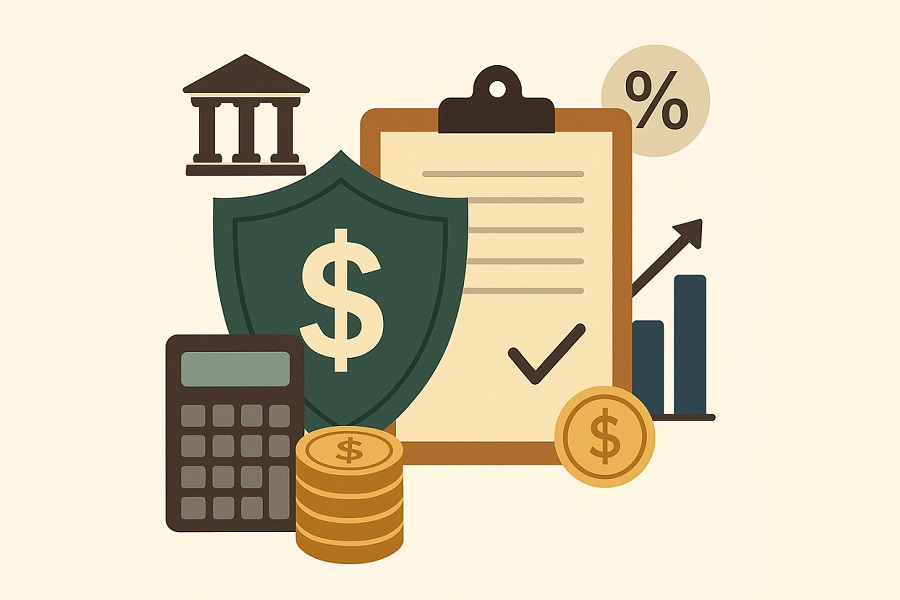Tax-Efficient Wealth Management: Strategies for Minimizing Taxes and Maximizing Long-Term Growth

As taxes rise, individuals are increasingly focusing on ways to manage their wealth more efficiently by minimizing tax burdens. Tax-efficient wealth management isn't just about reducing the taxes you pay today; it's about implementing strategies that help you build wealth and achieve financial goals while minimizing the impact of taxes over time.
Why Tax-Efficient Wealth Management Matters
With inflation on the rise and taxes consuming a larger share of income and investment gains, adopting tax-efficient strategies is crucial for long-term wealth preservation and growth. Over time, the compound effect of taxes can erode the value of investments, which makes tax-efficient wealth management not just a smart move—it’s an essential one. By strategically investing in tax-advantaged accounts and choosing the right investment vehicles, individuals can boost their long-term growth potential while paying fewer taxes.
Key Strategies in Tax-Efficient Wealth Management
Utilize Tax-Advantaged Retirement Accounts
Retirement accounts such as 401(k)s, IRAs (Individual Retirement Accounts), and Roth IRAs allow individuals to reduce their taxable income today or grow wealth without the burden of taxes for a long period. For example:
Traditional 401(k) or IRA: Contributions to these accounts are made pre-tax, lowering your taxable income in the year you contribute. Taxes are paid when you withdraw funds in retirement, typically when you may be in a lower tax bracket.
Roth IRA: While contributions to a Roth IRA are made with after-tax money, the investment grows tax-free, and withdrawals during retirement are tax-free as well. This makes it a valuable tool for wealth-building, particularly if you expect to be in a higher tax bracket during retirement.
Invest in Municipal Bonds
Municipal bonds, issued by state and local governments, are a favored option for investors looking to reduce their tax liability. The interest earned on municipal bonds is typically exempt from federal taxes, and in some cases, state taxes as well. These bonds can be especially beneficial for individuals in higher tax brackets, offering them a steady income stream while minimizing the tax impact.
Capital Gains and Tax-Deferred Accounts
Long-term capital gains, which are earned from assets held for over a year, are taxed at lower rates than short-term gains. Holding investments like stocks, bonds, and real estate for the long term not only allows you to benefit from compound growth but also reduces your tax rate on those gains. This is a key strategy for growing wealth over time without incurring heavy taxes.
Additionally, tax-deferred accounts like 529 college savings plans for education expenses can also offer tax advantages, depending on the nature of the investment.
Tax-Loss Harvesting
Tax-loss harvesting involves selling investments that have decreased in value to offset gains realized from other investments. The losses can be used to offset taxable income, thus lowering the amount of taxes you owe. This strategy is especially useful at the end of the year and is a great way to minimize taxes on capital gains.
Diversify with Tax-Efficient Funds
Investing in tax-efficient mutual funds or exchange-traded funds (ETFs) is another way to keep taxes low. These funds are designed to minimize distributions, which means they generate fewer taxable events. ETFs, in particular, are more tax-efficient than mutual funds because of their structure and the way they are traded.
Why Focus on Tax-Efficiency?
The long-term benefits of tax-efficient wealth management are significant. Over time, tax savings can compound, creating a larger nest egg for retirement or other long-term financial goals. By reducing the impact of taxes, individuals can ensure that more of their investment returns stay invested, allowing them to grow wealth faster.
The impact of taxes isn’t just limited to income taxes; capital gains taxes, dividend taxes, and estate taxes all contribute to the erosion of your wealth. By using tax-efficient strategies, individuals can reduce their taxable income, defer taxes, and take advantage of various tax breaks to boost their savings.
Moreover, as governments worldwide continue to increase taxes to finance public services and economic recovery efforts, individuals must plan ahead and optimize their financial strategies to avoid the negative impacts of higher tax rates.
Conclusion
In an era of rising taxes and inflation, wealth management strategies that prioritize tax efficiency have never been more important. Whether it's through tax-advantaged retirement accounts, municipal bonds, long-term investments, or tax-loss harvesting, individuals can safeguard their assets and enhance their wealth-building potential. By managing taxes wisely, you can create a more secure financial future that grows steadily, with less taken away by taxes.
























